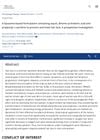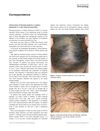 59 citations,
May 2014 in “Expert Opinion on Therapeutic Targets”
59 citations,
May 2014 in “Expert Opinion on Therapeutic Targets” The document concludes that targeting 5α-reductase, the androgen receptor, and hair growth genes, along with using compounds with anti-androgenic properties, could lead to more effective hair loss treatments.
 38 citations,
July 1989 in “Archives of dermatological research”
38 citations,
July 1989 in “Archives of dermatological research” Testosterone causes hair loss in AGA mice, which are good for testing baldness treatments, and both minoxidil and cyproterone acetate can prevent this hair loss.
 February 2024 in “Plastic and Reconstructive Surgery – Global Open”
February 2024 in “Plastic and Reconstructive Surgery – Global Open” Stem cell therapies show promise for hair regrowth in androgenetic alopecia.
 February 2024 in “Clinical, Cosmetic and Investigational Dermatology”
February 2024 in “Clinical, Cosmetic and Investigational Dermatology” Certain fats in the blood are linked to an increased risk of male pattern baldness.
 8 citations,
September 2016 in “Reviews in Endocrine and Metabolic Disorders”
8 citations,
September 2016 in “Reviews in Endocrine and Metabolic Disorders” Skin health and diseases are closely linked to metabolic processes.
 September 2023 in “Medical & Clinical Case Reports Journal”
September 2023 in “Medical & Clinical Case Reports Journal” Platelet-Rich Plasma (PRP) may increase hair density and thickness in Androgenetic Alopecia, but it's not significantly better than a placebo.
 2 citations,
September 2023 in “Health science reports”
2 citations,
September 2023 in “Health science reports” People with certain skin conditions, especially androgenic alopecia, are more likely to have metabolic syndrome.

The study concluded that Frontal fibrosing alopecia can affect younger people, is often missed in men, and may be autoimmune-related.
 10 citations,
October 2018 in “Dermatologic Therapy”
10 citations,
October 2018 in “Dermatologic Therapy” The lotion with equol, dihomo-γ-linolenic acid, and propionyl-l-carnitine was effective in reducing hair loss in men and women.
 31 citations,
April 2018 in “Plastic and Reconstructive Surgery”
31 citations,
April 2018 in “Plastic and Reconstructive Surgery” PRP therapy may improve skin and hair conditions, but more research with standard methods is needed.
 1 citations,
February 2018 in “The Journal of Sexual Medicine”
1 citations,
February 2018 in “The Journal of Sexual Medicine” Ultrasound shows 96% of young men with erectile dysfunction after using finasteride have abnormal penile tissue.
 13 citations,
January 2018 in “International Journal of Dermatology”
13 citations,
January 2018 in “International Journal of Dermatology” The study found that treatment improved hair condition in patients with Fibrosing Alopecia in a Pattern Distribution in Chile.
 14 citations,
September 2018 in “Biochemical and Biophysical Research Communications”
14 citations,
September 2018 in “Biochemical and Biophysical Research Communications” Growing hair cells with dermal cells can potentially treat hair loss.
 September 2010 in “European Urology Supplements”
September 2010 in “European Urology Supplements” Opioid use may lower PSA levels, suggesting a possible role in prostate cancer control; PSA testing is useful for detecting prostate cancer; serum triglycerides are not linked to prostate cancer risk; and higher urethral PSA levels may be associated with local hormone activity.
 September 2010 in “European Urology Supplements”
September 2010 in “European Urology Supplements” The document does not confirm if radical prostatectomy is the best treatment for locally advanced prostate cancer.
 November 2023 in “Current Dermatology Reports”
November 2023 in “Current Dermatology Reports” Oral minoxidil is effective for various hair loss types and may improve male sexual function, but aspirin can reduce its effectiveness.
 January 2016 in “International Journal of Medical Research and Health Sciences”
January 2016 in “International Journal of Medical Research and Health Sciences” Baldness (androgenic alopecia) could be a risk factor for prostate cancer.
 April 2024 in “Indian journal of ophthalmology. Case reports”
April 2024 in “Indian journal of ophthalmology. Case reports” Using minoxidil for hair loss might rarely cause a vision problem where fluid builds up under the retina.
 2 citations,
February 2020 in “Journal of Plastic Surgery and Hand Surgery”
2 citations,
February 2020 in “Journal of Plastic Surgery and Hand Surgery” Good-looking donor sites for hair transplants usually have higher hair density and thicker hair.

Many men with androgenic alopecia also have dyslipidemia.
 June 2023 in “Skin Research and Technology”
June 2023 in “Skin Research and Technology” High-resolution MRI can distinguish between tertiary androgenetic alopecia and severe alopecia areata by measuring scalp and tissue thickness and hair follicle depth.
 July 2023 in “IntechOpen eBooks”
July 2023 in “IntechOpen eBooks” Some types of hair loss can be reversed, others are permanent, and treatments vary by type.
 4 citations,
May 2006 in “International Journal of Dermatology”
4 citations,
May 2006 in “International Journal of Dermatology” Hair loss seen as natural; short haircuts help cope.
 3 citations,
September 2022 in “Cureus”
3 citations,
September 2022 in “Cureus” Platelet-rich plasma shows promise for treating various female reproductive health issues but requires more research.
 1 citations,
January 2019 in “PubMed”
1 citations,
January 2019 in “PubMed” Baldness score can't be used to predict prostate size.
 1 citations,
January 2017 in “Journal of Community & Public Health Nursing”
1 citations,
January 2017 in “Journal of Community & Public Health Nursing” Wearing a cap doesn't affect quality of life for Indian men with hair loss, but severe hair loss does lower it. Older men have more severe hair loss, and those who wear caps more often want less treatment.
 1 citations,
March 2022 in “PubMed”
1 citations,
March 2022 in “PubMed” Platelet-rich plasma can help treat scarring hair loss caused by Discoid Lupus Erythematosus.
 32 citations,
January 2022 in “International Journal of Molecular Sciences”
32 citations,
January 2022 in “International Journal of Molecular Sciences” Melatonin, a hormone, can help protect skin from aging by reducing stress, inflammation, and damage, and may also help treat hair loss in women.
 January 2022 in “Surgical and Cosmetic Dermatology”
January 2022 in “Surgical and Cosmetic Dermatology” People with androgenic alopecia (AGA) have a higher chance of getting metabolic syndrome.
January 2022 in “Menoufia Medical Journal” Obesity can cause various skin problems, with differences in prevalence between males and females.




























